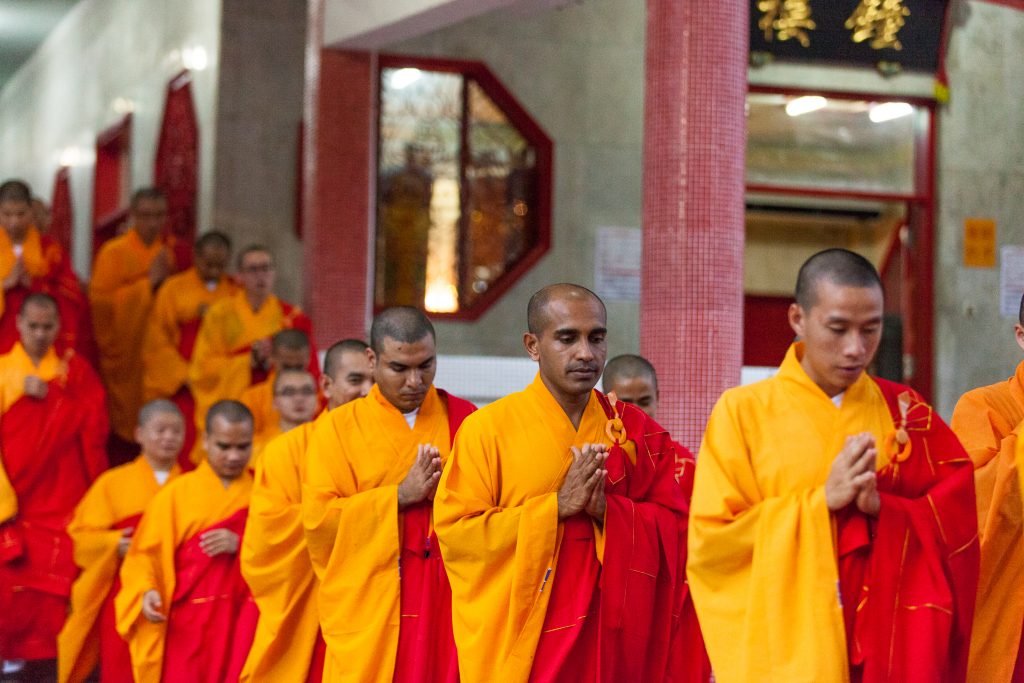Monkhood FAQs 出家答疑

1. Is ordination essential to cultivate oneself? 修行必须出家吗?
One may consider, “If ordination does not hold any special meaning or provide benefits to one’s spiritual life, why did the Buddha exemplify the life of a monk by shaving his head at the Nerañjarā River and guiding his Sangha towards arahanthood after his enlightenment?”
When we renounce the world and ordain as a monk, we commit ourselves to follow the path that the Buddha has designed for us – one that is filled with inspiring and practical teachings to rid our mental defilements and suffering and aid us in achieving liberation from our karma and future rebirth.
人们可能会思考:“如果出家没有任何特殊的意义,也无法为生活带来利益,那么为什么佛陀在成道之后,要在尼连禅河边剃发,并引导僧团走向阿罗汉果呢?”
当我们出家为僧,就必须承诺遵循佛陀之道——这条道路充满启发性和实用的教义,可以消除我们的烦恼与苦难,从而帮助我们从业力与轮回中解脱。
2. What are the prerequisites for joining the monastic order? 出家需要什么条件?
Open to male aspirants under the age of 45 who are free of dependents and debts, and who are in good physical and mental health.
长期出家的申请条件为45岁以下的男性,没有眷属与负债,且身心健康。
3. How are Buddhist monks selected? 僧人如何被筛选?
Upon receiving your application form, we will screen it for suitability and may invite you to attend an interview at our monastery. If you exhibit potential, we will schedule you for another formal interview with the Abbot. The successful applicant will then be granted permission to stay in the monastery as a lay postulant to accustom to the monastic’s daily lifestyle.
The lay postulant will undergo the process of ordination in two stages:
First stage: he will become a novice monk (sāmaṇera) and live within the monastic community, where the basic training of monkhood will be taught.
Second stage: he will undergo the triple platform (higher) ordination to become a full-fledged monk (bhikkhu) and be granted full monastic status and responsibilities.
After that, the bhikkhu is expected to stay in KMSPKS as a Sangha member and be instructed by Abbot.
收到申请者的出家申请表格后,寺院将进行审核筛选并安排面试。若申请者通过第一次面试,寺院将安排申请者与方丈的第二次面试。两次面试通过以后,申请者将获准以居士净人的身份留在寺院,配合寺院的作息。
申请者将进行两个阶段的受戒仪式:
第一阶段:受沙弥戒,在寺院里接受基本修道训练。
第二阶段:受三坛大戒成为比丘,担负如来家业的重任。
之后,申请者将以比丘的身份留在寺院,接受方丈的指导。
4. Why should a monk reside in the monastery? 出家为什么要住在寺院?
The monastery offers a conducive environment that facilitates a monk:
- to follow the daily routine, which lessens external distractions and creates more time for meditation, studying, and developing one’s mind.
- to positively transform himself to foster harmony, collaboration, and mutual support within the Sangha.
- to abandon his attachment and wrong views, and be open to broader perspectives from the Dharma.
- to discipline himself through proper conduct (sīla) and meditative concentration (samādhi) that leads to the generation of wisdom (paññā).
- to walk the bodhisattva path of serving others while cultivating the six perfections (pāramitās).
- to nourish oneself through the Buddha’s Dharma and apply them as wisdom to overcome daily greed, anger, and delusion.
- to develop the higher virtues and become a good role model to guide and inspire the community.
寺院提供一个有利于僧人修行的环境:
- 以遵循日常生活规律,减少外界干扰,为禅修、学习和修行提供更多的时间。
- 积极提升自己,遵守僧团中的六和敬,维系僧伽内部理和与事和的氛围。
- 摒弃执取与五见,保持开放的心态,接纳佛陀的教诲。
- 通过遵守戒律和专注禅定的修持,培养内在的智慧。
- 行菩萨道,修习六度波罗蜜。
- 在佛法的滋养下,以般若智慧克服贪、嗔、痴。
- 培养良好的品德,成为社群中的榜样,引导他人走向正道。
5. What does one's cultivation entail after joining the monastic order? 出家后的修行是什么?
After joining the monastic order, one’s cultivation entails:
- to renounce from the world of unquenchable desires and suffering.
- to spiritually develop oneself through the Noble Eightfold Path to refine his moral conduct, cultivate a higher mind, and develop higher wisdom.
- to strengthen his mindfulness to surpass greed, hatred, and delusion.
- to nurture a one-pointed mind and enhance his perseverance through concentration (samatha) meditation, and realise the Buddha’s Dharma and the true essence and meaning of life through insight (vipassanā)
- to break free from his habitual behaviour and acquire higher virtues.
- to deepen his compassion and aspire toward attaining an awakened mind (bodhicitta).
- to selflessly serve and benefit the community and society.
出家以后,修行的过程包括:
- 摆脱世俗的欲望和苦难。
- 通过八正道的修持提升自己,完善道德行为、培养更高的心智,发展更高的智慧。
- 通过正念超越贪、嗔、痴。
- 通过止禅专注一心,通过观禅修习佛法。
- 摆脱习性,培养良好的品德。
- 长养慈悲心与菩提心。
- 无私奉献,利益众生。
6. What do monks do in a day? 出家的日常作息为何?
In our monastery, the general routine of our Sangha is as follows:
在我们的寺院中,僧人的日常作息如下:
|
6am |
Wake Up |
|
6.20am – 8am |
Morning Chanting, Breakfast |
|
8am – 9am |
Meditation |
|
9am – 11am |
Duty in the monastery |
|
11am – 2pm |
Lunch, Rest, Self-Study |
|
2pm – 4pm |
Duty in the monastery |
|
4pm – 5.30pm |
Evening Chanting and Dinner |
|
5.30pm – 10.30pm |
Self-Study & Meditation |
|
10.30pm |
Lights out |
* Timetable subject to change. 时间表将可能更动。
7. Is it challenging to become a Buddhist monk? 出家是否具备挑战性?
The process of becoming a competent Buddhist monk can take years of practice. It involves comprehending the bhikkhu precepts, studying the ancient texts, developing a spiritual practice that includes meditating, chanting, and prostration, and mastering other skills necessary to fulfil his appointment in the monastery.
成为一名合格的佛教僧人需要多年的修习,其中包括理解比丘戒律、研究佛教经典、落实各种修行(如禅修、念诵、礼拜等)以及掌握在寺院中履行职责所需要的技能。
8. Can a Buddhist monk quit? 出家可以还俗吗?
If a sāmaṇera or bhikkhu wishes to disrobe and return to lay status, he should officially inform the Abbot of his decision and be formally guided in the disrobing process before leaving the monastery.
如果一位沙弥或比丘希望还俗回归居士身份,应当正式向方丈禀报自己的决定,并在离开寺院前接受正式指导,进行还俗程序。
9. Can family and friends visit a monk after entering the monastic order? 出家后,家人和朋友可以前来探望吗?
Yes, they can. You are allowed to maintain contact with them. You are encouraged to inspire them through your self-transformation and knowledge of the Dharma.
是的,出家后可以与亲朋戚友保持联系。僧人应通过自身的转化和对佛法的了解来启发身边的人。
Enquiry 询问:6489 5300 | publicaffairs@kmspks.org
